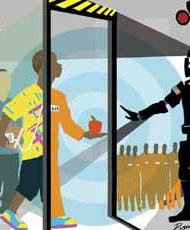
It’s safe to say that Tyell Morton, a high school senior at Rushville High in Indiana, is probably not laughing anymore. A few months ago the eighteen year old was just another teen enjoying his senior year of high school and eagerly awaiting graduation. Today, he faces up to eight years in prison because of a high school prank gone wrong.
Shocking, right? Well, yes, it is shocking and unfortunate, but, sadly, not at all that surprising.
More and more, the public education system operates as a criminalization system. The American Civil Liberties Union is tracking this disturbing trend called the “school-to-prison pipeline,” where the policies and practices of our nation’s public schools, especially those serving our most at-risk children, lead to an alarming number of kids in the juvenile and criminal justice systems. We believe that this pipeline is reflective of our country’s prioritization of incarceration over education. From inadequate resources to assist students in schools to strict enforcement of the harsh zero-tolerance disciplinary actions, many students, overwhelmingly students of color, face very adult consequences for adolescent mistakes. Tyell’s situation is another example of the extreme responses by school and city officials that can forever change a young man’s life and opportunities.
Tyell was arrested and charged for putting a blow up doll in a bathroom stall on the last day of school as a prank. He was identified because video footage showed a man entering the high school with a hooded sweatshirt and leaving a package in the bathroom. School officials evacuated the premises and called the Indiana State Bomb Squad, fearing that the package was a bomb. No one was injured, no property was damaged, and no dangerous materials were found. Although he had not been in any trouble prior to this incident, Tyrell now has a felony charge of criminal mischief.
There is no doubt that a student who engages in mischievous actions should be punished in some form, but a criminal felony charge seems far out of proportion to the circumstances. Should he have to carry the felon label for the rest of his life?
If overly punitive school discipline practices are premised on deterring kids from doing dangerous things, research has shown that implementing these harsh consequences has had little or no effect on the rate of juvenile crime. Even more troubling, studies have shown that African American youths consistently receive harsher treatment in the juvenile justice system at most stages of processing, and that the arrest disparities between black and white youth continue to grow.
The school discipline and juvenile arrest facts indicate a disturbing pattern of overcriminalizing the actions of minority youths that must end. Placing national attention on a situation like Tyell’s is a step in the right direction, but action must follow. Urge your schools to eliminate zero tolerance policies and to instead adopt positive behavioral supports and other early interventions, which have been proven to improve school climate.
Learn more about racial justice: Sign up for breaking news alerts, follow us on Twitter, and like us on Facebook.

